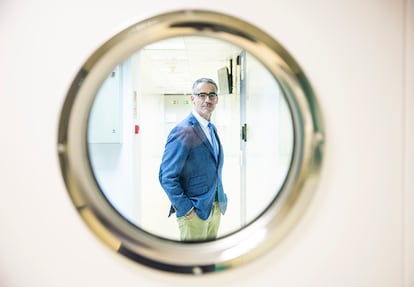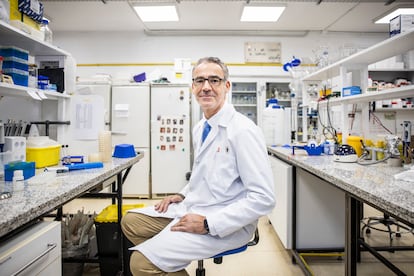Bruno González-Zorn, microbiologist: ‘Mortality is increasing from diseases that we previously had under control’
The researcher talks to EL PAÍS about the rise of antibiotic-resistant bacteria, what can be done to address the issue and why it’s been 30 years since a new family of antibiotics was last discovered

Antibiotic-resistant bacteria is scaring the planet. The global number of deaths from antibiotic-resistant bacteria is already in the hundreds of thousands, with one study putting the figure at 1.2 million a year. The scientific community is rushing to look for new tools to deal with the issue before it is too late.
From the front line of battle, microbiologist Bruno González-Zorn — the director of the Antimicrobial Resistance Unit at the Complutense University of Madrid and advisor to the World Health Organization (WHO) — is optimistic. After years of “preaching in the desert,” receiving scant interest from institutions, he says he has managed to sway opinion and is starting to see progress.
“This makes me think that in the coming years we will make more progress, there will be better prevention plans in hospitals, more awareness among the population, more optimized consumption and some preventive or treatment molecule that will help us more,” predicts the scientist, who spoke to EL PAÍS after taking part in a conference on antimicrobial use in Terrassa, Spain.
Despite his enthusiasm and hope, the 52-year-old Spanish doctor admits that there is still work to do and that efforts must be quickened. The researcher refuses to point the blame. “We are all co-responsible. The key is joint cooperation without pointing fingers at each other,” he says.
Question. Who suffers from anti-biotic resistances? What is the profile of the patient?
Answer. It is important to know that, even if you do not take antibiotics, the bacteria that live in hospitals, for example, which are more resistant to antibiotics, are the ones that affect you. You may be a young and healthy person, but when you go to the hospital, you are affected by the bacteria that has been living in the intensive care unit (ICU) for a long time and is resistant to all antibiotics. The profile is of a person who arrives [in hospital] and, after surgery, for example, the post-surgical infection, which is normal in every hospital in the world, becomes so difficult that it ends up killing the patient.
Q. Is the era of antibiotics coming to an end?
A. We are beginning to enter a post-antibiotic era because mortality is increasing from diseases that we previously had under control. We have more and more pan-resistant bacteria: before we talked about bacteria that resist many antibiotics, and now we are talking about pan-resistant bacteria, which resist them all. Five years ago, we only had these in a few places in the world, such as India and China. Now, in practically all Spanish hospitals, we have pan-resistant bacteria to antibiotics. It is advancing and it is of great concern. At some point we are going to have a bacterium that spreads very well, that is very resistant to antibiotics, and then we will be alarmed. That is going to happen, and we have been warning of this for a long time, so we need many people to take important treatment and prevention measures.
Q. Is it possible that we will see people die, for example, from an injury they got by falling in the street?
A. We are already seeing it. We are already seeing urinary infections that suffer complications and where before they responded well to antibiotic treatment, now the patient is dying because they are not cured with antibiotics.
Q. Have we reached a point of no return? Or could we go back to the antibiotic era by taking measures?
A. It’s a complex issue. There are some bacteria that, when they are no longer subjected to the antibiotic, become susceptible very quickly and very easily. So, in some cases, the rollback is very fast and effective. For example: colistin is a last-resort antibiotic in hospitals, which has been widely used in animals. But in that context, it has gone from being widely used in Spain to practically not at all, and the bacteria have immediately become sensitized to colistin. But there are other resistances in which it will be more difficult to regain that susceptibility: for example, with resistance to carbapenems or third-generation cephalosporins, we are seeing that bacteria appear that are very happily resistant even if the antibiotic is not present.

Q. Bacteria, for the sake of their survival, will try to continue to resist antibiotics forever. Is this an indefinite war?
A. It is indefinite. Bacteria are the most common living being on Earth. Antibiotics have done a lot of good, but effectively, if you stop developing new antibiotics — and we have not discovered a new family of antibiotics for 30 years — and only use those old weapons, bacteria become resistant. We need new families of antibiotics and as we develop them, we need new vaccines and new strategies to fight bacteria.
Q. In a television program in which you participated while traveling to India, carbapanema was bought without a prescription in a pharmacy. This is one of the last-resort antibiotics that are used when nothing else works. What do you do when this is happening, and we live in a globalized world?
A. We have to fight against it. In the end, resistance in each country depends on the antibiotics used in the country. It’s not that everything only comes from the outside, everything colonizes our ecosystems and we are lost. National and local action is essential. The Dutch go to India ten times more than we do and have much fewer cases of these bacteria. There is a direct relationship between antibiotic consumption in a country and resistance: even if they travel, bacteria colonize when that antibiotic is present and if not, they lose that resistance.
Q. What impact did the pandemic have on the fight against antimicrobial resistance?
A. In the short term, it has had a huge impact. Due to Covid, antibiotic-resistant bacteria have appeared that we did not expect to have until 2030. Many respiratory viruses open the door to secondary bacterial infections and, at the beginning, with Covid, they began to be treated with antibiotics. But, we quickly realized that Covid patients were not dying from a secondary bacterial infection, but from the famous cytokine storm, so patients began to be treated with corticosteroids instead of antibiotics. In the rest of the countries of the world, the population in ICUs increased, these units were overused beyond their capacity, there were more hospital-acquired infections and more consumption of antibiotics. The pandemic enormously accelerated resistance to antibiotics. So much so that I think that the 10 million deaths from this cause that were expected in 2050 are going to be seen in 2040 because there has been an enormous acceleration of bacteria resistant to last resort antibiotics.
Q. Another variable that influences resistance is wars. There are now several active armed conflicts around us. How will this affect antibiotic resistance?
A. There have already been patients from Ukraine with pan-resistant bacteria that were not in our region. Why? Because in conflict sites, there is what we can practically call a perfect storm for the generation of resistant bacteria: there is no diagnostic system for diseases, there are a lot of open wounds that are contaminated with many different types of bacteria, you need broad-spectrum antibiotics en masse where you don’t even have access to antibiotics and you give whatever you have… And that whole cocktail accelerates the formation of antibiotic resistant bacteria in an exponential way.
Q. To combat the resistance, researchers are attacking on several fronts. But you said that there has not been a new family of antibiotics available for more than 30 years. Isn’t the pharmaceutical industry interested in finding a solution?
A. The economic model of antibiotic development is broken. Right now, there is no pharmaceutical industry with more than 500 workers in the world that is developing an antibiotic. They have abandoned it because it is not profitable. There is a lack of economic incentive. We are developing the prize model, which is now being discussed in the European Union: whoever brings an antibiotic to the market will receive a prize of €300 million, for example, which every country has contributed to, because we need an antibiotic against these bacteria. Or we extend a patent for any molecule they have in their portfolio.
Q. At a therapeutic level, one of the ongoing investigations is the use of bacteriophage viruses — phages — to annihilate antibiotic-resistant bacteria. What are the most promising lines of research?
A. Phages are promising, but you have 100 times more phages in your intestine than bacteria, and there are mechanisms for bacteria to resistant phages. So phages are one possibility, but there are many others. For example, nanotechnology techniques so that molecules can detect where the infection is and release a more concentrated antibiotic. Artificial intelligence is helping us a lot to know how an antibiotic is going to behave and how to treat it individually. We could also develop CRISPR-introducing bacteria, which ideally would be able to inoculate a CRISPR system into pathogenic bacteria so that their DNA is digested and they die. There are many very original strategies, many for intestinal health and prevention. For example, intestinal health control and probiotics and prebiotics: bacteria that colonize an ecosystem that cannot be colonized by antibiotic-resistant bacteria.
Sign up for our weekly newsletter to get more English-language news coverage from EL PAÍS USA Edition
Tu suscripción se está usando en otro dispositivo
¿Quieres añadir otro usuario a tu suscripción?
Si continúas leyendo en este dispositivo, no se podrá leer en el otro.
FlechaTu suscripción se está usando en otro dispositivo y solo puedes acceder a EL PAÍS desde un dispositivo a la vez.
Si quieres compartir tu cuenta, cambia tu suscripción a la modalidad Premium, así podrás añadir otro usuario. Cada uno accederá con su propia cuenta de email, lo que os permitirá personalizar vuestra experiencia en EL PAÍS.
¿Tienes una suscripción de empresa? Accede aquí para contratar más cuentas.
En el caso de no saber quién está usando tu cuenta, te recomendamos cambiar tu contraseña aquí.
Si decides continuar compartiendo tu cuenta, este mensaje se mostrará en tu dispositivo y en el de la otra persona que está usando tu cuenta de forma indefinida, afectando a tu experiencia de lectura. Puedes consultar aquí los términos y condiciones de la suscripción digital.









































